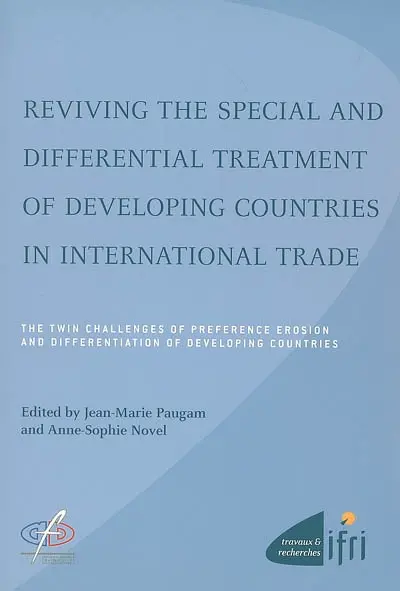en savoir plus

Permet à tous ses détenteurs d'obtenir 5% de réduction sur tous les livres lors du retrait en magasin (réduction non cumulable avec les réductions de type étudiant).
Offre également un certain nombre d'avantages auprès de nos partenaires.
Avec les favoris, retrouvez dans un espace les sélections effectuées au fur et à mesure de vos navigations dans le site.
Constituez pour votre usage personnel vos listes de livres en prévisions d'achats futurs et votre sélection d'articles, dossiers, événements, vidéos ou podcasts préférés ou à découvrir plus tard...
Il suffit simplement de cliquer sur "Ajout Favori" sur chaque page qui vous intéresse pour les retrouver ensuite dans votre espace personnel.
Requiert un compte Mollat
Requiert un compte Mollat
Reviving the special and differential treatment of developing countries in international trade : the twin challenges of preference erosion and differentiation of developing countries
en savoir plus
Résumé
Issu d'un colloque organisé en octobre 2005 à Paris, l'ouvrage aborde deux dimensions de la problématique du développement dans les négociations commerciales : la question de l'avenir des systèmes de préférences et de leurs enjeux pour les pays les plus vulnérables à la libéralisation internationale ; et celle de la différenciation des pays en développement, au regard des règles de l'OMC. ©Electre 2026
Quatrième de couverture
Reviving the Special and Differential Treatment of Developing Countries in International Trade
Since the inception of the multilateral trading system, optimally articulating international trade liberalization commitments with developing countries national economic strategies has been a central debate. The launch of the Doha Development Agenda (DDA) in 2001 installed, in theory, the trade and development nexus at the very heart of the WTO negotiations. The principle of Special and Differential Treatment (SDT) asserts the need to adapt international trade rules to the specific economic situation of DCs.
However, forty years after being developed, the main concepts underlying the traditional approach of SDT in the WTO seem largely exhausted. Based on the notions of « preference » and « non reciprocity » of trade commitments, the SDT embodies a systemic contradiction within a world trading system built upon the basic principles of « non-discrimination » and « reciprocal commitments ». The stalemate of SDT and market negotiations over the issues of DC differentiation and preference erosion suggest that the system may have reached the bottom of the contradiction, contributing to hold back the prospects of a successful « development round ».
Against this backdrop, this volume addresses two key issues in the development dimension of the DDA, and aims at identifying avenues for a way forward in the WTO negotiations. The first issue is the future of non reciprocal preferences : what kind of trade and development strategies and insurance against adjustment shocks can be proposed to the countries - in particular members of the G90 - facing the threat of preference erosion ? The second issue relates to DC differentiation : is it possible to craft a new burden-sharing of global trade responsibilities between developed and emerging economies, in particular G20 leaders ?
This book brings together original contributions prepared for the conference on The Future of Special and Differential Treatment, organized jointly by the Institut Français des Relations Internationales (Ifri) and the Agence Française de Développement (AFD) on 28 October 2005, in Paris.
Fiche Technique
Paru le : 05/05/2006
Thématique : Economie internationale/mondialisation
Auteur(s) : Non précisé.
Éditeur(s) :
IFRI
Collection(s) : Travaux et recherches de l'IFRI
Contributeur(s) : Directeur de publication : Jean-Marie Paugam - Directeur de publication : Anne-Sophie Novel - Auteur : - Editeur scientifique (ou intellectuel) :
Série(s) : Non précisé.
ISBN : Non précisé.
EAN13 : 9782865921713
Reliure : Broché
Pages : 242
Hauteur: 22.0 cm / Largeur 15.0 cm
Épaisseur: 1.5 cm
Poids: 384 g

